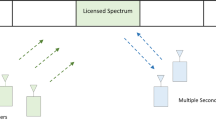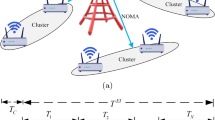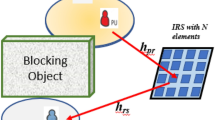Abstract
Owing to the spectrum scarcity and energy constrained devices in wireless networks arises the demand for an efficient spectrum sensing technique which improves both sensing performance and energy efficiency for cognitive radio networks. This paper proposes a cooperative spectrum sensing scheduling (CSSS) scheme for heterogeneous multi-channel cognitive radio networks with the objective of finding an efficient sensing schedule to enhance network utility while keeping the energy depletion at a lower level. We start with formulating the CSSS problem as an optimization problem, which captures both the energy-performance and performance opportunity trade-offs. We prove that the formulated CSSS problem is non-deterministic polynomial hard (NP-hard). To tackle the higher computational complexity of the formulated problem, we propose a greedy-based heuristic solution, which produces a sub-optimal result in polynomial time. To reduce energy consumption during spectrum sensing, we make secondary users to adaptively decide on the sensing duration based on the received signal-to-noise ratio (SNR), where higher SNR leads to lower sensing duration and vice-versa. For enhancing network throughput, SUs sense multiple channels in the order of their suitability for data transmission to explore as many numbers of channels as possible within the permitted maximum sensing time. We consider erroneous nature of reporting channel to make the cooperative decision robust against errors during reporting. Simulation based results show the effectiveness of the proposed scheme in terms of utility, energy overhead, and the number of channels explored compared to similar schemes from literature.









Similar content being viewed by others
References
Mitola, J., & Maguire, G. Q. (1999). Cognitive radio:Making software radios more personal. IEEE Personal Communications, 6(4), 13-18.
Akyildiz, I. F., Lo, B. F., & Balakrishnan, R. (2011). Cooperative spectrum sensing in cognitive radio networks : A survey. Physical Communication, 4(1), 40-62.
Ghasemi, A., & Elvino, S. (2005). Collaborative spectrum sensing for opportunistic access in fading environments. In Proceedings of the IEEE DySPAN, Baltimore, MD, USA (pp. 131–136).
Quan, Z., Cui, S., Sayed, A. H., & Poor, H. V. (2008). Optimal multiband joint detection for spectrum sensing in cognitive radio networks. IEEE Transactions on Signal Processing, 57(3), 1128–1140.
Zhang, T., & Tsang, D. H. (2011). Optimal cooperative sensing scheduling for energy-efficient cognitive radio networks. In Proceedings of the IEEE INFOCOM, Shanghai, China (pp. 2723–2731).
Eryigit, S., Bayhan, S., & Tugcu, T. (2013). Channel switching cost aware and energy-efficient cooperative sensing scheduling for cognitive radio networks. In: Proceedings of the IEEE ICC, Budapest, Hungary (pp. 2633–2638).
Eryigit, S., Bayhan, S., & Tugcu, T. (2013). Energy-efficient multichannel cooperative sensing scheduling with heterogeneous channel conditions for cognitive radio networks. IEEE Transaction on Vehicular Technology, 62(6), 2690–2699.
Bagheri, A., Ebrahimzadeh, A., & Najimi, M. (2020). Game-theory-based lifetime maximization of multi-channel cooperative spectrum sensing in wireless sensor networks. In Wireless networks.
Azarfar, A., Liu, C. H., Frigon, J. F., Sansò, B., & Cabric, D. (2018). Joint transmission and cooperative spectrum sensing scheduling optimization in multi-channel dynamic spectrum access networks. In Proceedings of the IEEE DySPAN, Piscataway, NJ, USA (pp. 1–10).
Yang, T., Wu, Y., Li, L., Xu, W., & Tan, W. (2019). Fusion rule based on dynamic grouping for cooperative spectrum sensing in cognitive radio. IEEE Access, 7, 51630–51639.
Deng, R., Chen, J., Chau, Y., Peng, C., & Youxian, S. (2011). Energy-efficient cooperative spectrum sensing by optimal scheduling in sensor-aided cognitive radio networks. IEEE Transactions on Vehicular Technology, 61(2), 716–725.
Sun, X., Zhang, T., & Tsang, D.H.K. (2011). Optimal energy-efficient cooperative sensing scheduling for cognitive radio networks with qos guarantee. In Proceedings of the 7th international wireless communications and mobile computing conference, Istanbul, Turkey (pp. 1825–1830). IEEE.
Wang, Y., & Lin, X. (2014). Cooperative sensing scheduling in cognitive radio networks with multiple primary networks. In Proceedings of the IEEE GLOBECOM (pp. 822–827).
Liu, C. H., Azarfar, A., Frigon, J. F., Sanso, B., & Cabric, D. (2015). Robust cooperative spectrum sensing scheduling optimization in multi-channel dynamic spectrum access networks. IEEE Transactions on Mobile Computing, 15(8), 2094–2108.
Hao, X., Cheung, M. N., Wong, V. W. S., & Leung, V. C. M. (2012). Hedonic coalition formation game for cooperative spectrum sensing and channel access in cognitive radio networks. IEEE Transaction on Wireless Networking, 11(11), 3968–3979.
Li, H., Xing, X., Zhu, J., Cheng, X., Li, K., Bie, R., et al. (2016). Utility-based cooperative spectrum sensing scheduling in cognitive radio networks. IEEE Transaction on Vehicular Technology, 66(1), 645–655.
Nath, A., & Sarma, N. (2017). A distributed solution for cooperative spectrum sensing scheduling in multi-band cognitive radio networks. Journal of Network and Computer Applications, 94, 69–77.
Yang, T., Wu, Y., Li, L., Xu, W., & Tan, W. (2019). Distributed coalition formation game for enhancing cooperative spectrum sensing in cognitive radio ad hoc networks. IET Networks, 9(1), 12–22.
Zhao, J., Liu, Q., Wang, X., & Mao, S. (2018). Scheduling of collaborative sequential compressed sensing over wide spectrum band. IEEE/ACM Transactions on Networking, 26(1), 492–505.
Li, X. (2019). Probability-based spectrum sensing and data transmission scheduling for cognitive radio sensors. IEEE Sensors Journal, 19, 7129–7140.
Olawole, A. A., Takawira, F., & Oyerinde, O. O. (2019). Cooperative spectrum sensing in multichannel cognitive radio networks with energy harvesting. IEEE Access, 7, 84784–84802.
Jin, Z., Yao, K., Lee, B., Cho, J., & Zhang, L. (2019). Channel status learning for cooperative spectrum sensing in energy-restricted cognitive radio networks. IEEE Access, 7, 64946–64954.
Yucek, T., & Arslan, H. (2009). A survey of spectrum sensing algorithms for cognitive radio applications. IEEE Communications Surveys & Tutorials, 11(1), 116–130.
Weinstock, H. C. (2006). Focus on cognitive radio technology. Nova Science Publishers
Urkowitz, H. (1967). Energy detection of unknown deterministic signals. Proc. IEEE, 55(4), 523–531.
Liang, Y. C., Zeng, Y., Peh, E. C. Y., & Hoang, A. T. (2008). Sensing-throughput tradeoff for cognitive radio networks. IEEE Transaction on Wireless Communications, 7(4), 1326–1337.
Choi, H. H., Jang, K., & Cheong, Y. (2008). Adaptive sensing threshold control based on transmission power in cognitive radio systems. In Proceedings of the IEEE CROWNCOM (pp. 1–6). Singapore.
Proakis, J. G., & Salehi, M. (2001) Digital communications (Vol. 4). McGraw-hill
Zhang, W., & Letaief, K. B. (2008). Cooperative spectrum sensing with transmit and relay diversity in cognitive radio networks. IEEE Transaction on Wireless Communications, 7(12), 4761–4766.
Karp, R. M. (1972). Reducibility among combinatorial problems. In Complexity of computer computations (pp. 85–103).
Sun, X., & Tsang, D. H. (2013). Energy-efficient cooperative sensing scheduling for multi-band cognitive radio networks. IEEE Transactions on Wireless Communications, 12(10), 4943–4955.
Acknowledgements
This work has been supported by MHRD sponsored Center of Excellence under FAST MLRBDA project for the period of 2014–2020, Govt. of India.
Author information
Authors and Affiliations
Corresponding author
Additional information
Publisher's Note
Springer Nature remains neutral with regard to jurisdictional claims in published maps and institutional affiliations.
Rights and permissions
About this article
Cite this article
Chauhan, P., Deka, S.K., Chatterjee, B.C. et al. Utility driven cooperative spectrum sensing scheduling for heterogeneous multi-channel cognitive radio networks. Telecommun Syst 78, 25–37 (2021). https://doi.org/10.1007/s11235-021-00785-y
Accepted:
Published:
Issue Date:
DOI: https://doi.org/10.1007/s11235-021-00785-y




